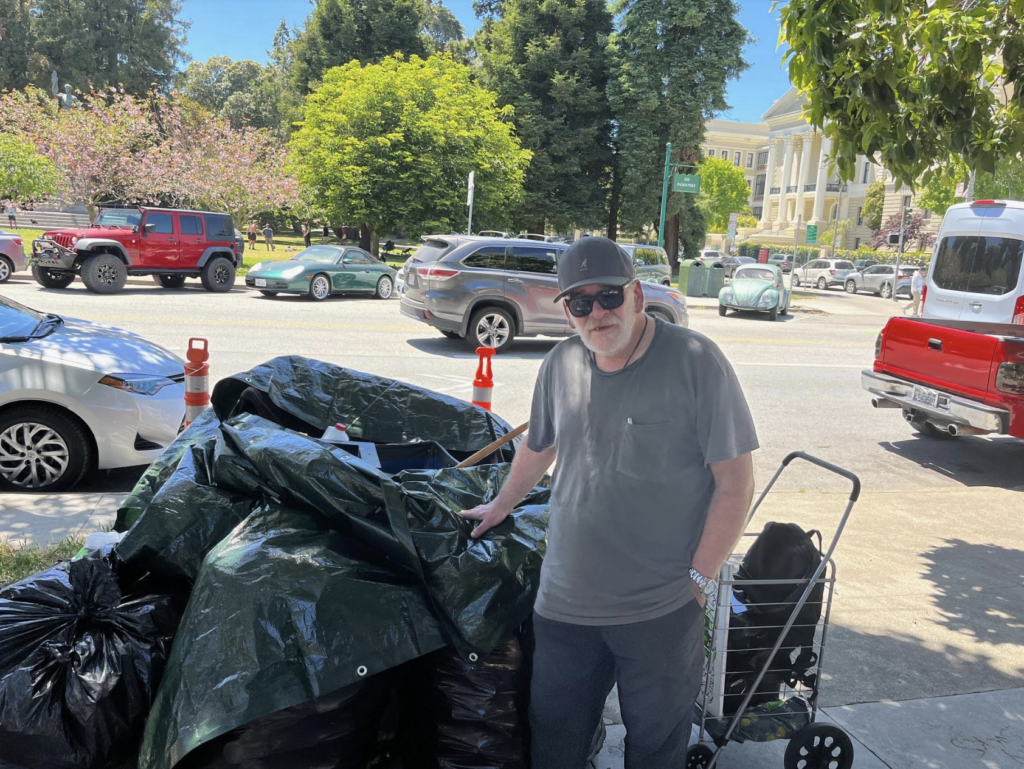There are hundreds of stories in San Francisco about people who are abused by the system that is supposed to address the unhoused population. I just happened to get a tip about this one and some video.
It’s particularly poignant because the person who lost almost all of his belongings is an artist, who had to sue in a landmark case to get out of county jail. City workers, he told me, threw away several paintings that he’d already been paid for, and almost all his art supplies.
This is not how it’s supposed to work.
James Reem has lived in San Francisco since 1979. He went to St. Ignatius High School. He’s been in trouble with the law, and spent time behind bars. In 2017, he sued because a county magistrate held him on $330,000 bail, which he couldn’t possibly pay, and got a federal court ruling freeing him.

In 2019, he got out of jail, and moved into a place on Clayton St. The conditions were terrible, he said, and he argued with the landlord, who eventually tried to evict him. When he fought the eviction, the landlord gave him $14,200 to move out.
This, like so much of the story, is so common these days. So is this:
Reem said he took the money and bought a former FedEx van, which he figured he could live in. Like so many other vehicles where people live, it didn’t have the proper registration, so it got towed.
He managed to salvage a lot of his property—his life’s possessions—and having no money left, moved onto the streets. He lived mostly on Baker outside the DMV between Oak and Fell.
“I had nowhere to go,” he told me.
The sweeps started last year. Reem learned to move around, to get out of the way when the cops and the Department of Public Works came to clear the area.
On Monday, June 3, he faced another sweep. There’s no doubt that the city put up the required notices; there’s no doubt that the longtime encampment had left some trash in the area that needed to be removed.
Reem told me he piled his belongings into a couple of large carts, and moved down Baker to Hayes, where he turned the corner to be out of the line of sight of the sweepers.
But, he said, they came for him anyway.
Video taken during the incident, and shared with me, shows workers throwing away materials that he told me were his possessions. “They dumped it all upside down in the back of a truck,” he said. “They left me destitute.”
This is an old, sad story: The sweeps that Mayor London Breed has been promoting have left the unhoused in even worse conditions than they already suffered. The Mayor’s Office says some people refuse shelter, which is true: A shelter bed would have required Reem to get rid of most of his stuff. It can’t be stored in most city shelters.
Rachel Gordon, director of communications at DPW, gave me this statement:
Public Works, along with other City agencies, was involved in a scheduled and coordinated Healthy Street Operations Center encampment resolution on Monday morning near Baker and Fell streets. The area was posted for resolution with the requisite 72-hour notice, and anyone staying in the encampment was offered shelter and services. Of the 13 people engaged during this encampment resolution, one accepted offers of shelter, three refused shelter and nine declined to engage with the outreach team. Many of the campers at this site are long-term, chronically homeless and service-resistant.
Additionally, campers at this site were storing an inordinate amount of debris and garbage on the sidewalk.
When the encampment resolution team arrived, all campers were given an opportunity to remove their belongings from the area. They could take with them any items they wanted to. Some campers set aside and took paintings, art supplies and some other belongings. Crews then followed the court-approved bag and tag process and removed garbage and items comingled with needles, human waste and other health risks for disposal.
The video shows nobody bagging and tagging anything. Reem told me he was allowed to take only what would fit in two carts; he has no way to reclaim the rest of his stuff. (Oddly, since DPW is worried about “garbage,” he was allowed to keep several bags full of empty cans he sells to a recycling center.) I asked Gordon to let me know if DPW has any bags with his name on them.
Again: One story. I have heard similar ones many times.
But every unhoused person is a human being, and every time the city takes their possessions and throws them away, that person is treated as trash, too.
That’s the path San Francisco continues to follow.






